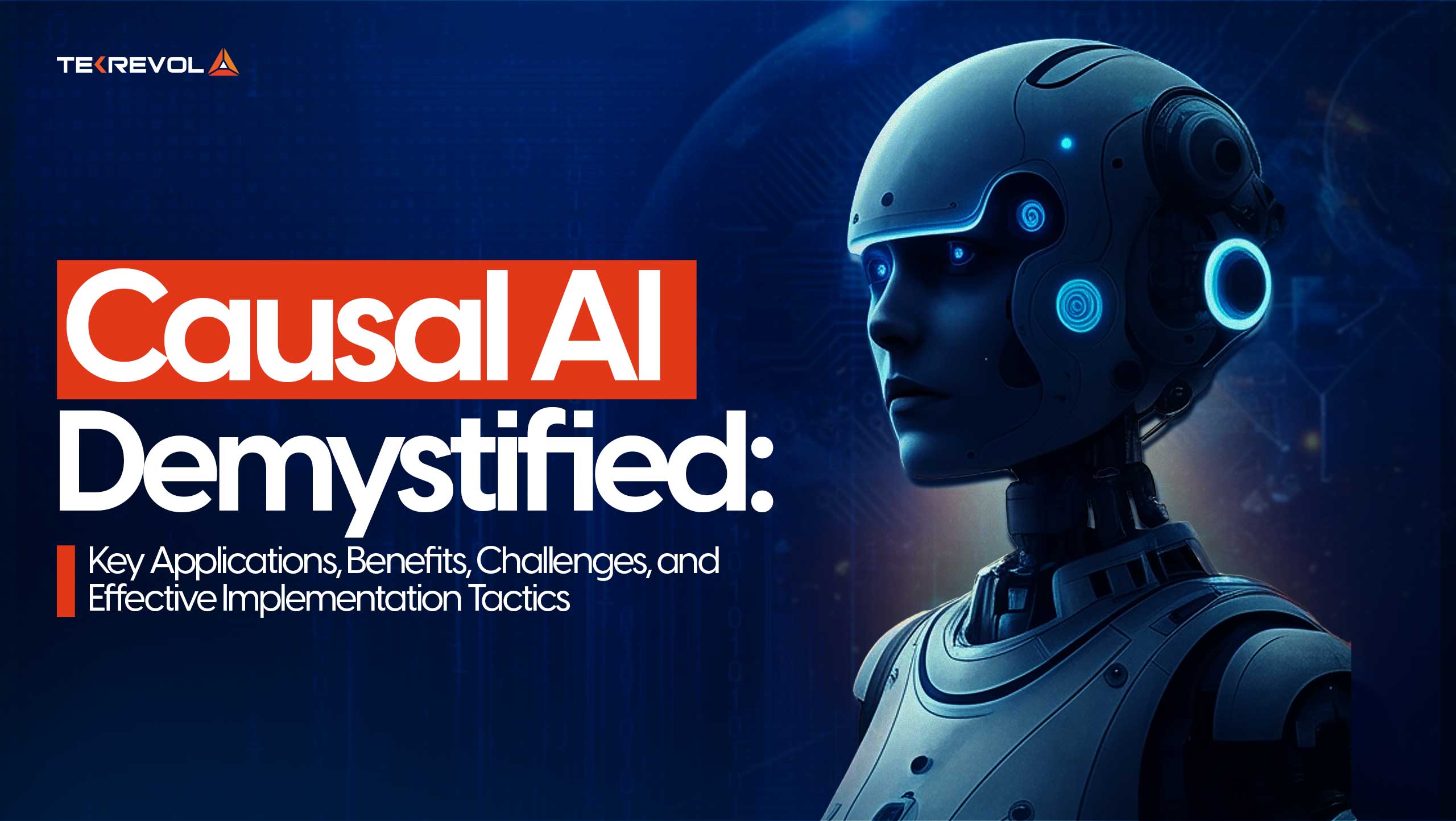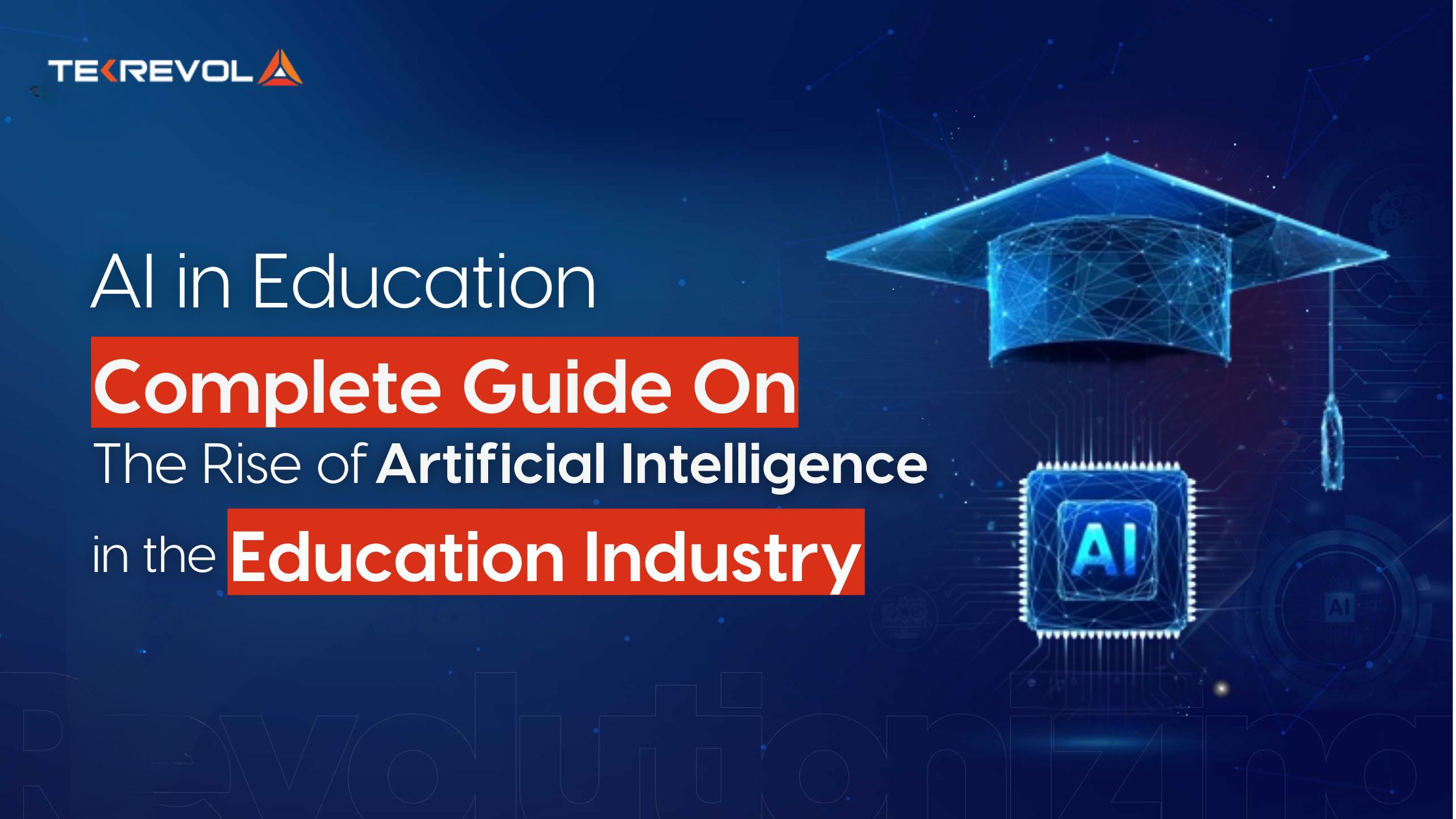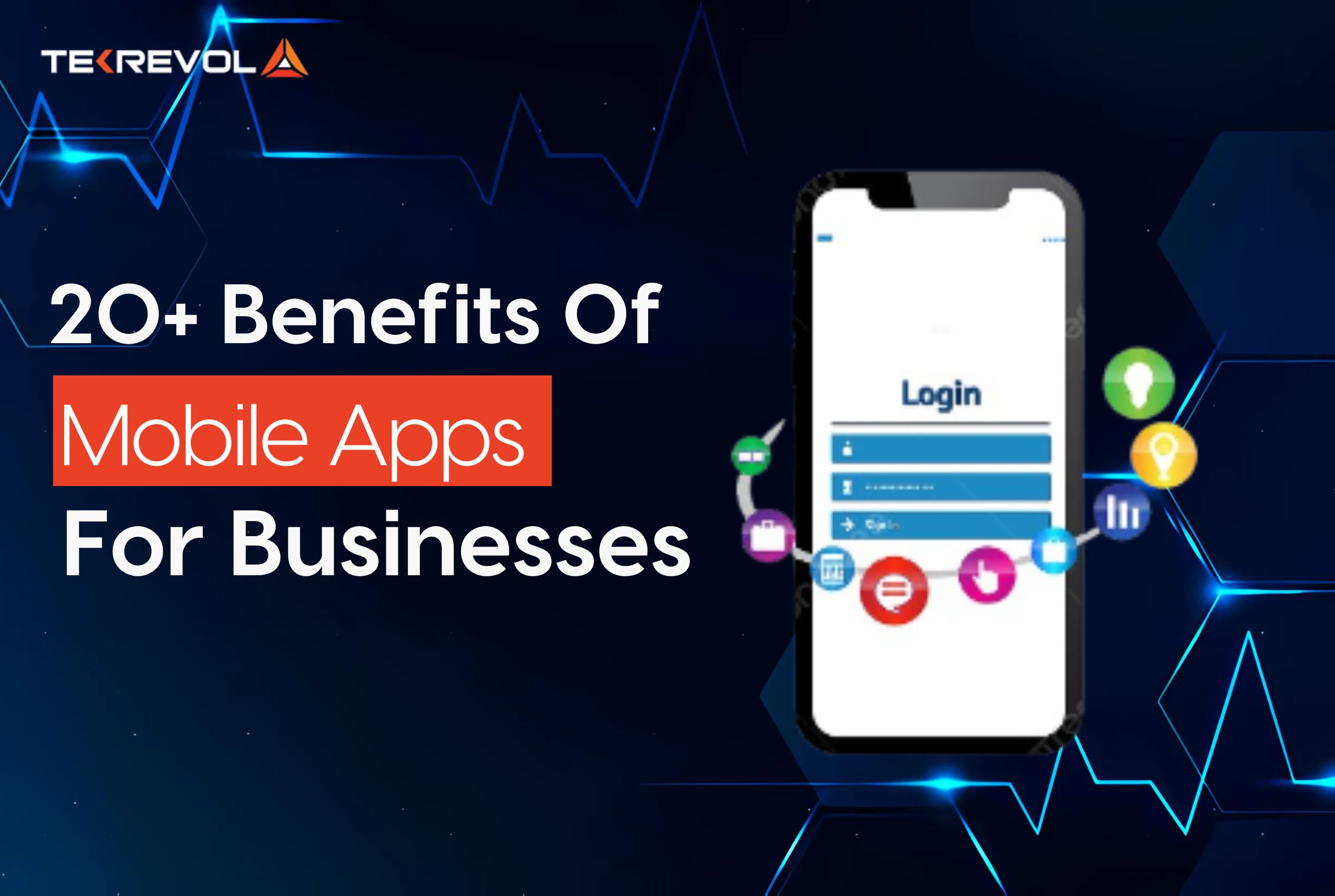Causal AI – sounds like an impressive thing, right? Well, it is the Sherlock Holmes of the AI world, not only predicting the outcome but also finding out the “why” behind it.
As traditional AI might say, “sales are likely to drop next month,” causal AI digs deeper to explain “why sales are dropping and what you can do about it.”
Having Causal AI around means that you are not just left wondering with predictions but rather empowered with insights so you can act upon them. If you find yourself rubbing your head, wondering how all this works, worry no more – we’ve got you covered.
Here is a comprehensive guide that explores causal AI key applications, their advantages and drawbacks, and how effectively you can leverage them to make your business a brand!
So, whether it is tech, healthcare, or finance, consider casual AI your secret weapon now. Let’s break down the tech buzzword and show you how it can change the way you make decisions!
What Is Causal AI? Why Is It A Big Deal?
Causal AI is the most advanced subset of artificial intelligence. It focuses on knowing why events happen rather than merely identifying patterns. While traditional AI thrives by identifying correlations, causal AI analyzes cause-and-effect relationships.
This capability transforms data-driven insights into AI-driven decision-making frameworks that influence favorable business outcomes.
How Is Causal AI Different from Traditional AI?
Let’s break it down with a comparison:
| Aspect | Traditional AI | Causal AI |
|---|---|---|
| Focus | Correlation and pattern recognition | Cause-and-effect relationships |
| Question | “What is likely to happen next?” | “What caused this to happen?” |
| Application | Predictive models | Strategic decision-making based on causality |
| Key Benefit | Forecasts based on trends | Actionable insights for direct interventions |
Why Causal AI Matters Now?
The globe produces 2.5 quintillion bytes of data a day, and with the rise of data, businesses face the challenge of moving away from predictive vs. causal analytics.
Not only predictions but clear-cut pathways are needed too to improve critical outcomes. For example, causal AI helps healthcare providers identify the main reasons for patient readmission and can save up to $20 billion annually
Real-World Use Cases Of Causal AI
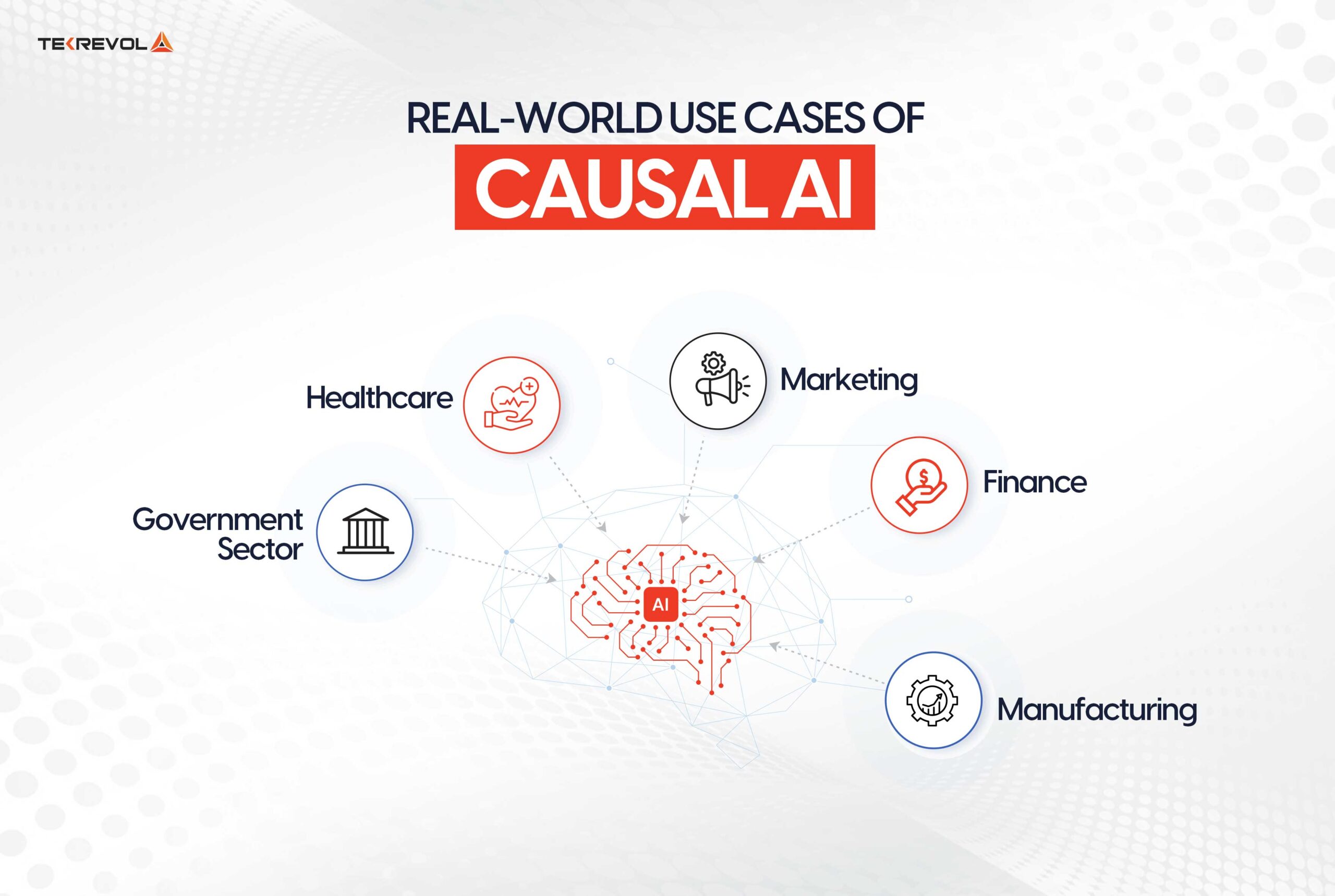
To be honest, technology is most interesting when it solves our day-to-day problems in the real world – and Causal AI technology does exactly that! It unveils the “why” behind the “what.”
Where traditional AI can simply predict outcomes, causal inference within AI goes to the root of why they happen – giving an AI Development company leverage to make smarter and bolder decisions.
Here is how causal reasoning applications are remodeling industries.
1. Healthcare
The health sector is full of AI decision-making opportunities. Machine learning causal analysis moves the game in diagnostics and treatment by targeting the source rather than symptoms.
Let’s consider clinical trials as an example. Pharmaceutical companies spend a total of $1.3 billion on a single drug, and many fail during clinical trials because they are correlation-based.
Using causal AI to determine which patients would respond best to treatment makes trials shorter, cheaper, and more effective.
Another example? Preventive care. With the benefits of causal AI in healthcare, hospitals can know what reduces hospital readmissions. Here’s a kicker: it often improves post-discharge follow-ups instead of building more hospital beds.
2. Marketing
Ever wonder why some ads just click with consumers while others don’t? Marketers using causal systems in AI predictions aren’t winging it – they know why.
Imagine a retailing giant that wants to reduce customer churn. Through causal reasoning applications, they find that sending personalized emails about loyalty rewards cuts churn by 25%. The correlation didn’t tell them that, but causal inference in AI did!
As the money speaks – Businesses using AI for actionable insights have reported 35% higher ROI on ad spend, proving that causal AI significantly improves business outcomes.
3. Finance
In the world of finance, nobody has time for “maybes.” This is where causal analysis in machine learning comes in – a place where fraud detection and risk modeling thrive.
Traditional models might flag anomalies like a sudden, huge transaction, but causal AI technology goes deeper – why did this transaction happen? What circumstances enabled it?
This allows banks to patch vulnerabilities before fraud escalates. Here’s a table that will help you understand the above information in a better way!
| Comparison: Fraud Management | Predictive Analytics | Causal AI |
|---|---|---|
| Focus | Pattern detection | Root cause identification |
| Explainability | Limited | High (Explainable AI solutions) |
| Outcome | Reactive measures | Proactive fraud prevention |
4. Manufacturing
Factories are the place where the future of causal AI systems for forecasting is bright! Imagine, instead of waiting for a machine to break, causal AI pinpoints what causes the breakdowns in the first place. This way, manufacturers save time and money, keeping production humming at full pace.
Companies using machine learning and causal AI claim a 40% reduction in downtime and a 25% decrease in maintenance costs annually. It’s not just predictive maintenance—it’s causal maintenance.
5. Government Sector
Governments worldwide are embracing AI in decision-making frameworks to address societal challenges. Predictive models can say, “Tax hikes might reduce smoking,” but causal reasoning applications reveal that “public education campaigns lead to longer-lasting change.”
In one notable case, data-driven insights with AI were used to help a US city improve traffic safety. For example, they analyzed the accident data and found that adding bike lanes to high-traffic zones reduced accidents by 18%, proving that causality beats guesswork.
- Curious how businesses are using Causal AI to solve real problems?
- Make the most out of your business with Causal AI now!
Why Are Businesses Betting Big On Causal AI?
Businesses are embracing causal AI technology not just because it is novel but because it directly addresses challenges that traditional AI often sidesteps.
Unlike predictive analytics, causal AI delves into the “why,” allowing organizations to make decisions that are not only informed but actionable.
Here’s how causal reasoning applications are reshaping business strategies across industries:
Benefits That Drive ROI
- Better Resource Allocation: Causal AI spends every dollar where it can turn out to be effective by identifying impactful interventions like which marketing campaign actually leads to increased sales or which supply chain changes are the most cost-effective.
- Improved Customer Retention: By understanding the root causes of churn, companies can implement preventative strategies. For example, Starbucks used causal analysis frameworks to reduce customer churn by 15%.
How Causal AI Improves Business Outcomes?
Here is a table that determines the shift from recognizing patterns to actively influencing outcomes – a transformation powered by AI systems for causal predictions.
| Feature | Traditional AI | Causal AI |
|---|---|---|
| Primary Focus | Identifying patterns in data (correlations). | Identifying causative relationships (actions). |
| Actionable Insights | Limited to trend forecasting. | Tailored to interventions for outcomes. |
| Explainability | Often a “black box.” | Provides clear, explainable AI solutions. |
| Flexibility Across Scenarios | Struggles with novel scenarios. | Generalizes well to unseen data challenges. |
Challenges In Adopting Causal AI
Causal AI technology promises much, but its adoption isn’t without challenges. Here’s an in-depth look at why organizations often hesitate to embrace this transformative innovation:
1. Data Quality and Accessibility
Causal AI works well with clean, structured, and diverse data. Today, most organizations are struggling with fragmented data silos or low-quality datasets.
It is reported that only 20% of enterprise data is adequately organized for advanced analytics, including causal AI. Without comprehensive data, causal analysis in machine learning becomes less reliable.
To overcome this, companies require robust data governance policies and tools that support data-driven insights with AI.
2. Causal Model Complexity
Building causal models is not just a coding activity – it requires domain expertise, knowledge of causal graphs, and familiarity with machine learning and causal AI. Most organizations lack this multidisciplinary expertise.
The key challenges include:
- Creating accurate causal graphs for dynamic systems.
- Elimination of spurious relationships and validation of interventions.
- Integration of causal inference into AI-driven decision-making pipelines.
According to a report by Gartner in 2024, 60% of organizations never deploy complex AI models as they remain stuck in advanced complexity.
3. Requirement for High Computational Resources
Causal inference is rather computationally intensive compared to traditional predictive vs. causal analytics. Advanced infrastructure is used to handle the processing of large data that is known best for elevating costs.
For example, causal prediction AI systems might require cloud solutions such as AWS or Azure, which increase operational costs. Practical implementation strategies for causal AI should consider scalable infrastructure to reduce these costs.
4. Resistance to Change
Causal AI requires a paradigm shift and decision-makers accustomed to standard predictive models often hesitate to adopt causal methods. Explainable AI solutions and causal frameworks require them to rethink their approach to AI in decision-making frameworks.
Organizations need to foster a culture of experimentation and education to overcome resistance. Evidence of how causal AI improves business outcomes—such as enhanced personalization or operational efficiency—can help build trust.
5. Lack of Standardization
While causal reasoning applications are burgeoning rapidly, the technology currently lacks standardized tools and frameworks. The lack of universal benchmarks complicates its deployment.
How To Overcome The Challenges Of Causal AI?
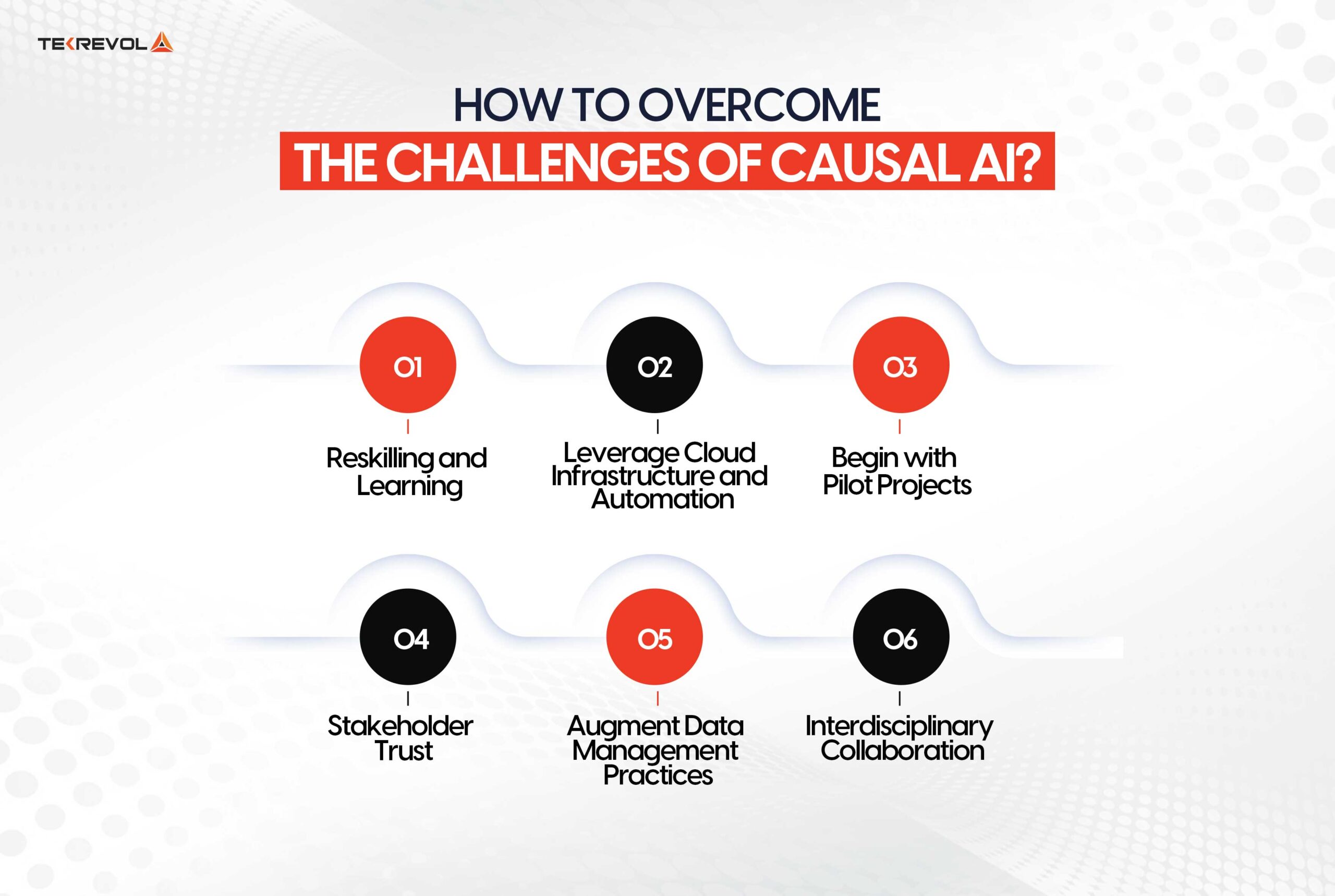
Implementing causal AI technology requires strategy and proactive actions. By addressing the common challenges head-on, organizations can build a robust foundation for integrating this transformative tool into their workflows.
Here’s how the challenges posed by Causal AI can be overcome:
1. Reskilling and Learning
The cause-inference mechanism in AI intimidates new teams that lack prior exposure to its operations. Therefore, only structured training helps to overcome these.
- Basic ideas of causal thinking.
- Use DoWhy, CausalNex, and Pyro for application purposes.
- Applying causal analysis to machine learning to real-life problems
Companies that train employees specifically on AI have 30% faster adoption times for advanced AI frameworks, suggests McKinsey. Collateral and online training are a low-cost alternative for developing internal expertise.
2. Begin with Pilot Projects
Small-scale, controlled test environment projects enable teams to establish feasible implementation strategies for practical and productive causal AI. For example, by testing AI systems for causal predictions concerning marketing campaigns, measured and quantifiable ROI would come with minimal risk.
Essential steps include:
- Choose low-stakes, high-impact problems.
- Track and compare outcomes against traditional predictive versus causal analytics
- Scale successful pilots throughout the departments.
3. Augment Data Management Practices
Causal AI requires good quality and accessible data to deliver data-driven insights. Overcoming the issue of disintegrated or unstructured data can surely help:
- Establish integrated data platforms for information that originates from various sources.
- Leverage automated data cleaning techniques to ensure accuracy.
- Ensure governance mechanisms for compliance and reliability. A study finds that firms utilizing centralized data systems have shown an increase of 23% in AI adoption performance.
4. Leverage Cloud Infrastructure and Automation
The computational needs of causal AI can stress on-premises infrastructure. Cloud solutions such as AWS SageMaker or Azure AI help simplify scalability, which makes it easier for organizations to handle complex causal graphs. Automation further helps by eliminating tedious tasks, such as variable identification and hypothesis testing.
5. Stakeholder Trust
Change is always resisted, but educating stakeholders on how causal AI improves business outcomes can help drive adoption. Use case studies or real-world use cases of causal AI to highlight tangible benefits, such as:
- Faster decision-making with AI for actionable insights.
- Cost savings through targeted interventions.
- Transparent communication, emphasizing explainable AI solutions, can bridge the trust gap and align teams.
6. Interdisciplinary Collaboration
Interdisciplinary applications of causal reasoning require close collaboration between data scientists, domain experts, and decision-makers.
Cross-functional teams ensure that causal models are developed in a manner that reflects the complexity of real-world applications while meeting business-specific needs.
- Ready to integrate causal AI into your workflows?
- Learn step-by-step practical implementation strategies from the experts
Practical Implementation Strategies For Causal AI
Implementing Causal AI technology in business systems requires a holistic approach, where both technical and strategic elements are meant to be incorporated.
Unlike traditional predictive analytics, causal inference in AI focuses on understanding and modeling the relationships between variables to determine the benefits it has stored for us in real life.
Here are key strategies for effective implementation:
1. Aligning with Business Goals
- Set clear objectives: Identify specific business challenges that the application can address, such as improving marketing ROI or optimizing supply chains.
- Align departments: Try to coordinate with data scientists, domain experts, and decision-makers who can help you guide the goals of an AI system in real business environments.
2. Data Quality and Preparation
- Collect appropriate data: Large datasets with representative relationships and dynamics between participants in the business.
- Data pre-processing: This is crucial to ensure that missing values, biases, and inconsistencies do not compromise causal analysis in machine learning.
- Feature selection: Choosing variables that are critical to causal modeling to represent the structure of the problem accurately
3. Selection of Model
- Implementation of advanced causal models: To capture complex causal relationships, use state-of-the-art AI systems for causal predictions, like Granger Causality or Structural Equation Models (SEMs).
- Machine learning and causal AI: Integrate machine learning algorithms with causal reasoning to refine the predictive models and produce accurate results.
4. Integration into Decision-Making Frameworks
- Embed AI into the decision-making: Use AI-driven decision-making frameworks to provide support for automated, data-driven insights. These insights empower decision-makers to act based on predicted outcomes.
- Real-time application: Leverage AI for actionable insights by creating real-time causal analyses in tasks like running a real-time marketing campaign and enhancing existing inventory management strategy.
5. Monitoring and Adjustment
A McKinsey report in 2023 states that 72% of the businesses that applied causal AI showed a significant improvement in decision-making accuracy, which improved operational efficiency by 12%.
Saying that, track the outcomes of implemented strategies and continuously refine the causal models based on new data and feedback. Explainable AI solutions ensure transparency in decision-making, making it easier to validate and adjust models.
Future Trends In Causal AI
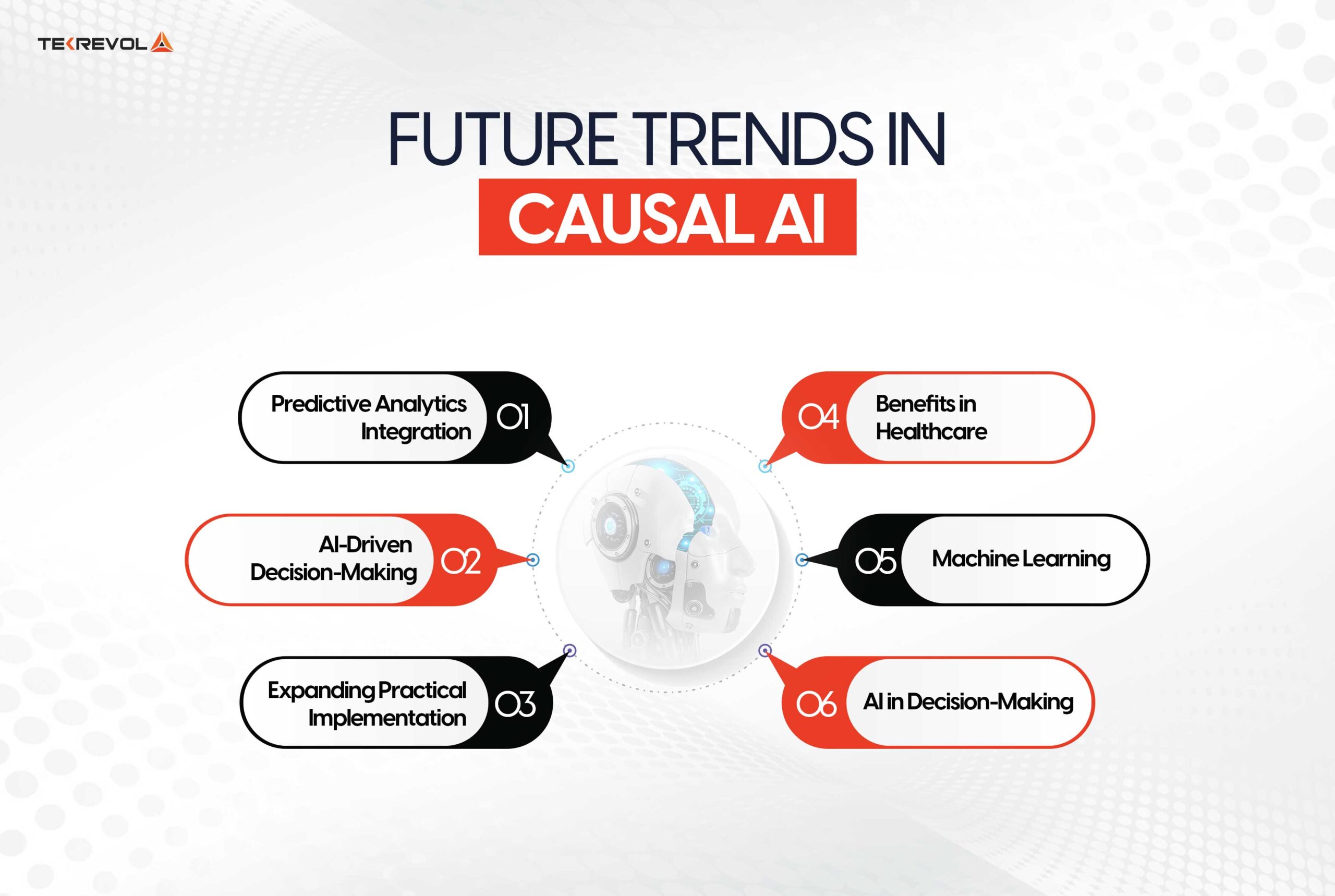
Causal AI is emerging as a transformative force in data science and machine learning, promising to redefine how businesses utilize AI for decision-making and predictive analysis.
With continued advances in causal inference in AI, the application of causal reasoning is opening new frontiers in healthcare, finance, and marketing.
Here are some of the most promising future trends in this area:
1. Causal AI and Predictive Analytics Integration
The future is in the integration of predictive vs causal analytics. Causal AI can enrich predictive models by providing a deeper understanding of cause-and-effect relationships driving outcomes, thereby leading to more accurate predictions and actionable insights.
- Predictive analytics focuses on forecasting outcomes based on historical data.
- Causal AI explains the “why” of these predictions, providing a stronger framework for decision-making.
2. AI-Driven Decision-Making and Business Outcomes
As AI systems for causal predictions advance, businesses will increasingly rely on data-driven insights with AI to inform strategic decisions. Causal AI technology offers the potential to improve business outcomes by enabling executives to understand the causal factors that drive success or failure in their operations.
Today, causal AI is used to optimize supply chains, customer segmentation, and financial forecasting in real-world business.
3. Expanding practical implementation strategies for causal AI
The adoption of causal analysis in machine learning will depend on practical implementation strategies for businesses. These will include overcoming challenges related to data quality, model complexity, and scalability.
Companies will invest in tools that help them translate causal reasoning applications into real-world solutions, making causal AI accessible and actionable.
4. Benefits in Healthcare and Other Industries
Without a doubt, causal AI in the health sector is going to change.
Causal AI has the potential to alter the course of personalized medicine and health management by producing actionable insights into patient outcomes, drug efficacy, and treatment plans.
5. Machine Learning and Causal AI: A Symbiotic Relationship
The future of AI and machine learning is symbiotic. Machine learning models that use causal inference techniques will give better insights and allow businesses to make decisions that are both data-driven and explainable.
6. AI in Decision-Making Frameworks
The future will see an increased integration of AI within decision-making frameworks. Organizations will apply causal reasoning applications to determine the factors most likely to influence outcomes, giving way to more complex decision-making models that reflect real-world problems.
How Tekrevol Can Help You Demystify Causal AI?
At Tekrevol, we specialize in making causal AI accessible and impactful for businesses across industries. Our expert team leverages cutting-edge causal reasoning applications to build tailored AI solutions that not only predict outcomes but also uncover the underlying causes driving these results.
With our deep expertise in machine learning and causal AI, we help you integrate AI-driven decision-making into your business operations, enabling smarter, data-backed decisions. Whether you are looking to enhance predictive analytics or implement AI for actionable insights, Tekrevol’s proven strategies and exquisite AI solutions ensure that you gain a clear understanding of how causal factors influence your business outcomes.
Saying that, let us guide you through the complexities of causal analysis in machine learning and get your business the limelight it deserves!

 624 Views
624 Views December 11, 2024
December 11, 2024